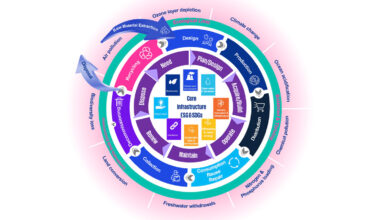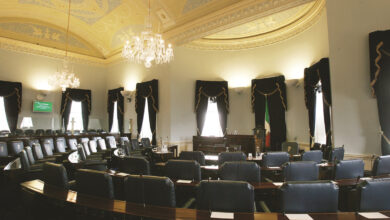The Dock: A conduit for artistic learning

The Dock, Carrick-on-Shannon’s arts centre, is the focal point of arts in County Leitrim, helping local artists to internationalise their work. The Dock’s Director, Sarah Searson, talks to Odrán Waldron about the uniqueness of the cultural landscape of Leitrim.
Searson outlines how The Dock’s reputation is “primarily defined by visual arts, nationally and the performing arts regionally” adding: “I believe in a concept of the arts providing a range of opportunities to receive art, whether through performance, visual arts, or talks and workshop. The Dock is like a library for arts experiences.”
Explaining how The Dock has enhanced the reputation of Leitrim-based arts, she states: “If you live locally and produce art, there is an opportunity to get involved and to develop your own creativity. The Dock is an organisation with a level of porosity that delivers an interesting dynamic programme but also facilitates a wider community to make things happen.”

The recent Sankey/Walker exhibition on display at the Dock.

Immersed by history
Situated on the banks of the River Shannon, The Dock – a play on the building’s former role – is located in Carrick-on-Shannon’s iconic 19th century courthouse building built in 1822 by William Farrell, a prominent Dublin-based architect active throughout early to mid-19th century Ireland, during the Georgian and early Victorian period, who was known particularly for his church and institutional designs. The building is connected to what is now the headquarters of Leitrim County Council, and was once a gaol, via underground tunnels. A Georgian mansion, previously the house of the presiding judge, sits behind the building.
Searson explains how the building’s history informs the approach taken by The Dock for the artwork exhibited within its walls. “Behind the building, where Leitrim County Council is headquartered now, was the gaol. As you approached, there were two gates through which you could see into that campus. There is an institutional memory in the building where you can see some of those ideas and very often with the visual arts, we will lean into that.
“The courthouse building came into a state of disrepair in the mid-1990s, and the community successfully fought for its restoration. It was reinstated for use in 2005. Since then, it has become a flagship building in terms of its meaning and place within Carrick-on-Shannon. I think it is very much an established part of the community, particularly through the work that The Dock undertakes with young people.”

Educating Leitrim’s youth
Searson believes the arts sector has been empowered in Ireland through its support in smaller towns, facilitating excellence.
Simultaneously, Searson emphasises the role played by arts centres at local level across Ireland in enhancing the education of young people: “When arts centres are resourced properly to engage in effective outreach projects and programmes that support people’s creativity, they can actually change the whole legibility of a town.
“When you look at the resources of Carrick-on-Shannon, such as The Dock, the cinema, the gym, and the vibrant food culture, each of those cultural aspects contribute to an enriched quality of living. They provide the town with a uniqueness, improving its overall attractiveness and vibrancy.
While showcasing some of the leading artists in Ireland, The Dock is also working to develop several digital resources that local schools can use. “The idea of being from Carrick and from Leitrim and being able to provide this cultural hub for schools in the county pervades far beyond the artwork itself. It is very much about cultivating ideas.
“The Dock seeks to nurture cultural interest particularly from a young age to influence their connection with art over a lifetime, so that when young people are at college or in later working life they are equipped to get involved in cultural debate, and critical discourse about arts and culture.”
A balancing act
Describing the “balancing act” of programming arts within the rich cultural heritage of County Leitrim, Searson says: “The Dock produces five big exhibitions annually, each of which incorporate between two to five artists.” Illustrating the gallery’s commitment to exhibiting emerging and established artist and interesting artistic collaborations, upon the visit of eolas Magazine, the gallery is showing a commissioned collaboration between Katherine Sankey, utilising video, sculpture, and drawing to connect with senior Irish artist Corban Walker.
“We invest heavily in those exhibitions to connect with people with the ideas and concepts at play,” Searson explains, concluding: “Additionally, we have a lot of smaller tangential events where we commission people – particularly younger artists – to undertake smaller interventions, often to reflect on their practice, so we can mediate some of their ideas beyond their studio and into the wider world using The Dock as a conduit for artistic learning.”
Profile: Sarah Searson

Sarah Searson has been Director of The Dock since 2015 and will resign the role in May 2023. She led the organisation through Covid and secured major capital funding for refurbishment in 2017.
Searson has lectured at Dublin Institute of Technology (TID) and University College Dublin (UCD). She also served as Arts Officer for Dún Laoghaire-Rathdown County Council for five years.





